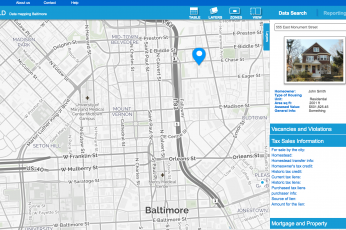



With support from the Abell Foundation, the Community Law Center (CLC) partnered with Baltimore Neighborhood Indicators Alliance (BNIA) and others to create the Baltimore City Open Land Database (BOLD) to advance tax sale reform in Baltimore City.
Every year in Baltimore, 6,000 – 10,000 property liens are sold at the City’s annual tax sale due to nonpayment of property taxes or other municipal liens, including water bills. Some of these properties later end up in tax foreclosure, and there is evidence to suggest that tax lien sales and tax foreclosures play a role in neighborhood disinvestment and decline.
In order to address the effect of tax sales and tax foreclosures on properties and homeowners, there is a robust and active local community of private and public entities working towards homeownership preservation, which has effected positive changes in state laws. In 2015, the Community Law Center (CLC) founded the Baltimore City Tax Sale Work Group as a subcommittee of the Baltimore Homeownership Preservation Coalition (BHPC). The Tax Sale Work Group was developed from CLC’s Public Nuisance Project, also funded by the Abell Foundation. CLC’s Public Nuisance Project demonstrated the power of community associations to bring code enforcement actions against the worst properties in their neighborhoods, but required nearly a full year of attorneys, law students, partners, staff, interns, and volunteers, to gather data on community associations, property ownership, and code enforcement status.
The BOLD web application arose out of the need to streamline data gathering, as well as the desire to put data into the hands of nonprofits, community development corporations, researchers, policymakers, and community stakeholders who are working to stabilize their communities, preserve homeownership, and break the cycle of vacant properties in Baltimore. BOLD both advances the use of data-driven tools for developing solutions to vacant property problems and streamlines the data collection process on Baltimore City properties.
CLC and BNIA co-authored a report documenting the need for the BOLD database and the steps taken to build it out using multiple data sources. The report is available here.